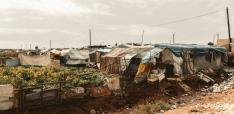Adaptive Context Analysis during Covid-19 - Listening to Local Voices During a Pandemic

With the advent of the Covid-19 pandemic two key tenets for humanitarian aid that often go together, context analysis and travel, are now in tension. World Vision’s Johan Eldebo shows how they’ve sought to overcome it by balancing the necessity for remote management with the ongoing need for locally informed analysis.
Understanding your context is the first step towards good humanitarian programming. It is also the first step towards keeping your staff safe. This requires first identifying the right questions to ask, then pursuing them until you have answers to act upon.
During Covid-19 this means collaborating online with people across the world, trying to balance a constant pandemic filled newsfeed with the reality that we are likely approaching a more significant “secondary impact” in the form of a food crisis. This is occurring during a time of little global leadership, with many countries that would normally take the lead preoccupied with domestic challenges. There is a real risk that those hardest hit may be left behind.
Humanitarians have for many years believed that the best way to learn about a context is listen to people who live there, including local communities, those most vulnerable and those who are or are likely to be recipients of aid. This is perhaps even more important if the country is fragile and fast changing. Yet, listening to local communities, often in remote villages and potentially dangerous areas is not easy. It takes time, costs money and can put staff members at risk. This intentionality of taking the time to listen is key to informing good decisions and being able to act on them responsibly, effectively and with acceptance, as demonstrated by research conducted by World Vision in 2019 on the impact of analysis.
Adding to these challenges, humanitarian context analyses must be rigorous enough to influence and support decision-making. This means that being right about an emerging crisis or situation on the ground is not enough. Analyses must also provide decision-makers with the credible arguments, talking points and possible solutions that they can use to win over and orientate others. This, together with a good tolerance for ambiguity, is key to being effective.
Three principles have stood out to us as critical to achieving these aims; timeliness, ownership and practicality.
- Timeliness because analysis needs to exist at the right time for decision-makers to use it. This means that analysis should, often, follow the timing of decision-making and make sure that decision-makers are as informed as possible when needed. Key decisions rarely wait for the time-line of analysis, which practically speaking often means that analysis should adapt to events taking place.
- Ownership because decisions in the humanitarian field are rarely taken in isolation. They happen in nuanced contexts, where the needs and viewpoints on many stakeholders – from internal programme staff to donor contacts – must be considered. This means by extension that there rarely is such a thing as an “objective decision based solely on quantifiable data”, nor should that be the aim. Quantifiable data should support decisions as much as possible, but other factors harder to quantify such as values, judgment, collaboration and leadership are also important. This is why ensuring that analysis connects to decision-makers through a collaborative process is important. Moreover, they lead to better and safer programmes.
- Practicality because the analysis must be useful. This may sound obvious, and it simply means that analysis needs to be written in such a way that users can understand it and that any actions recommended make sense to the people who could implement them. During a Covid-19 pandemic for example, recommendations should take into account the constraints of the disease, whilst acknowledging that many countries face challenges far more pressing challenges than the virus itself, such as food insecurity or other diseases.
Inspired by World Vision’s established GECARR (Good Enough Context Analysis for Rapid Response) methodology, our new GEOCARRs seeks to answer similar questions whilst accounting for the challenges raised by Covid-19. As travel to communities is first among them, GEOCARRs use online (hence the added ‘O’) survey questionnaires and interviews to enable ‘good enough’ remote analyses.
The first GEOCARR exercise was conducted by World Vision in April in Southern Africa, and the second in East Africa in May. The most obvious difference between it and its forebear was that the GEOCARR facilitation team could not meet key informants and communities in person.
To address this, the team conducted online interviews, surveys and a virtual workshop. Participants included local staff from the regions’ countries plus regional staff and external contacts from other agencies. The workshops included roughly 25 people, with the same number completing the surveys. In addition to this, a review of secondary data, such as reports, analyses and articles, was conducted, and its findings incorporated into the process.
This ensured that the GEOCARRs were still informed by local perspectives. Yet, online technologies cannot fully replace in-person communication, particularly not in cultures that are highly relational.
In practice this means that people are less likely to fully share their thoughts or even be able to. Indeed, much communication during in-person meeting can be conducted through body-language or even seating arrangements. This is mostly lost during calls, even if you have video function, which is hard in countries with slow connections. Analysts also cannot have the informal conversations that often take place during coffee breaks, and the crucial details that they can allow for. Lastly, online communication clearly favours people comfortable with technology and advantages those with the means to access to it.
Nonetheless, the combination of online engagements and a rapid literature review revealed that the growth and spread of the pandemic is a key theme for Western observers, while, in contrast, local voices are more concerned about the potential “secondary impact” of food insecurity, poverty and the spread of other diseases such as measles, AIDS and pneumonia. Accordingly, they worry about the potentially undue level of focus given to COVID-19.
This represents an important finding on how different parts of the world assess what is currently most important. This divergence will be critical for global organisations to take into account as they design their pandemic responses and resource allocations.
Upon further reflection, we have come to realise that good amount of humility is needed by anyone seeking to conduct context analyses under this new reality. Our GEOCARR process is both imperfect and necessary at the same time. But we believe it can help responders to take timely decisions that support effective and safe programmes. It can also help them to address both the primary impacts of the pandemic and its likely secondary impacts of food insecurity, growing poverty and lasting vulnerability.
Johan Eldebo works for World Vision as is Regional Security Director for Southern Africa. In this role he support security management, training and context analysis across 9 countries in Africa. He has worked in fragile contexts across Africa and the Middle East for the last ten years with context analysis, security management to support humanitarian operations. He is the co-creator of the Good Enough Context Analysis for Rapid Response (GECARR), and the online version (GEOCARR). Johan Is also a visiting scholar at the New York University Center for International Cooperation, focusing on humanitarian decision-making. Johan is a graduate of North Park University in Chicago and holds a Masters degree from King’s College London.
This article is written by the author and does not necessarily represent to official views of any organisation.
Image: residentevil_stars2001 via Flickr (CC BY 2.0)


